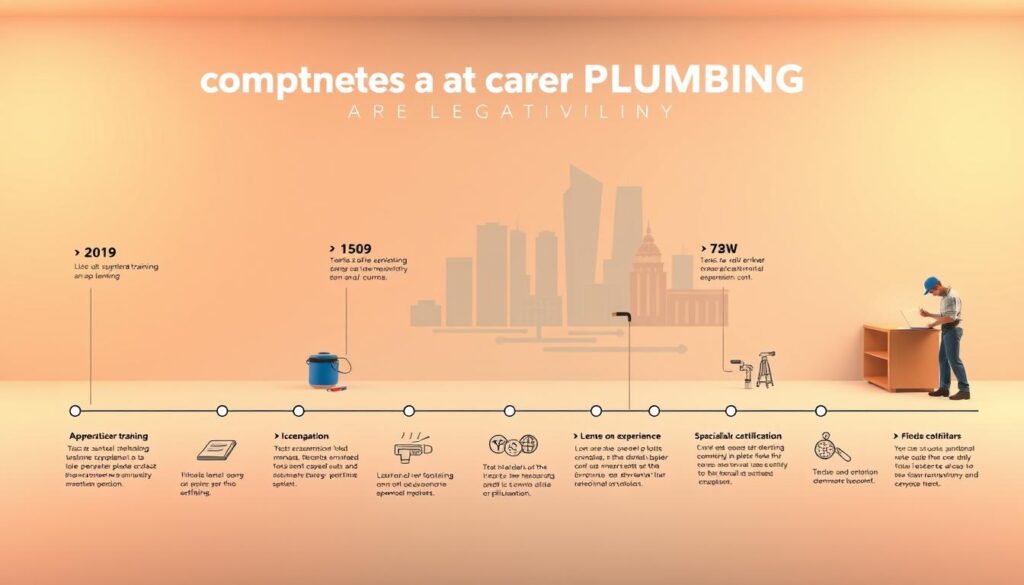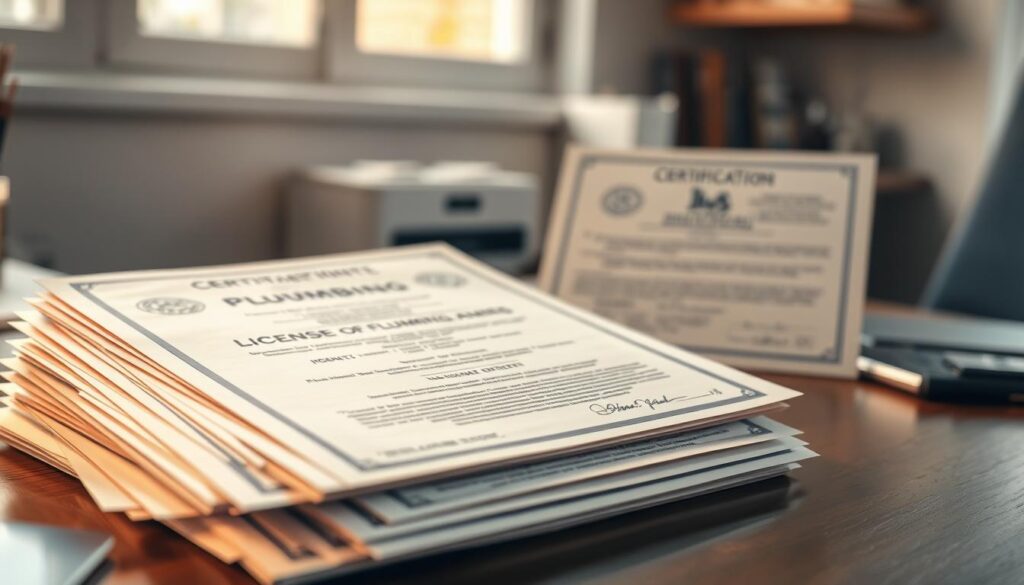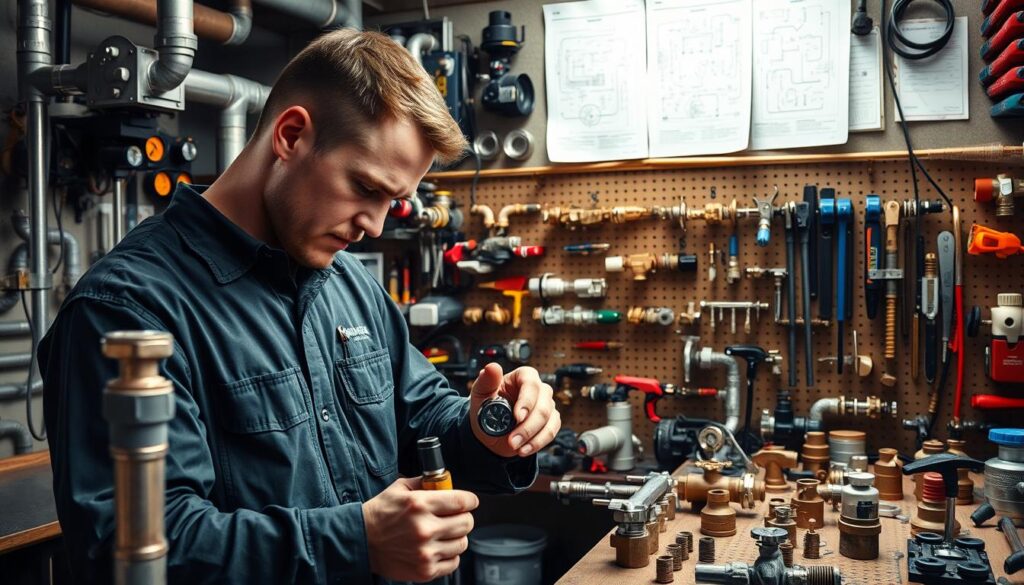Affiliate Disclosure
Plumber Guide Guys is a participant in the Amazon Services LLC Associates Program, an affiliate advertising program designed to provide a means for sites to earn advertising fees by advertising and linking to Amazon.
How Long Does It Take to Be a Plumber? Did you know only 1 in 10 people finish their plumbing certification? This shows how dedicated you need to be. To become a plumber, you must go through a lot of education, training, and growth.

Getting a plumber’s license takes time. It usually takes 4-5 years. You’ll learn in classrooms, get hands-on experience, and get special training. How fast you move forward depends on your hard work and commitment.
Being a plumber requires great skills, knowledge, and experience. Each step of your training helps you grow. You’ll go from a beginner to a pro who can handle big challenges.
Key Takeaways
- Plumbing certification typically takes 4-5 years
- Multiple training stages are required for full qualification
- Hands-on apprenticeship is critical to professional development
- Technical knowledge and practical skills must be balanced
- State requirements can impact training duration
Table of Contents
Understanding the Plumbing Career Path
Plumbing is a rewarding and stable career for those who enjoy hands-on work. To start your journey as a licensed plumber, you need to understand the basics of this field. It’s not just about technical skills. You also need dedication, physical strength, and a willingness to keep learning.
Basic Requirements and Prerequisites
To begin your path to becoming a licensed plumber, you must meet certain requirements:
- High school diploma or equivalent
- Minimum age of 18 years
- Physical fitness and strength
- Basic math and problem-solving skills
- Clean driving record
Career Opportunities in Plumbing
The plumbing industry offers many career paths, not just for homes. You could work in:
- Residential plumbing services
- Commercial building maintenance
- Industrial pipeline systems
- Municipal water infrastructure
- Specialized equipment installation
Industry Demand and Growth
Plumbing is a vital profession with good job security. The Bureau of Labor Statistics predicts strong growth. This makes plumbing a smart career choice.
| Job Sector | Projected Growth | Median Annual Salary |
|---|---|---|
| Residential Plumbing | 4.5% | $56,330 |
| Commercial Plumbing | 5.2% | $62,500 |
| Industrial Plumbing | 6.1% | $68,750 |
“The future of plumbing is bright for those willing to invest in their skills and training.” – Professional Plumbers Association
Becoming a licensed plumber requires strategic planning, consistent effort, and a passion for solving complex technical challenges.
Educational Foundation for Plumbers
Starting your journey to become a professional plumber requires a strong educational base. First, you need to finish high school or get a GED. This is a key step in getting ready for your plumbing career.
Plumbing trade school usually lasts from 9 months to 2 years. This depends on the program and what you want to learn. These schools teach you the important skills and knowledge needed to succeed in plumbing.
“Education is the passport to your future in the skilled trades” – Trade Professional Insight
Important parts of your education include:
- High school diploma or equivalent
- Technical and vocational training programs
- Mathematics and science coursework
- Technical drawing and blueprint reading
- Basic computer skills
These studies will teach you vital skills. You’ll learn about building codes, reading technical diagrams, and doing math for plumbing work.
| Educational Level | Duration | Key Learning Outcomes |
|---|---|---|
| High School | 4 years | Basic technical skills, mathematics |
| Vocational Program | 9-24 months | Specialized plumbing techniques |
| Technical Certification | 6-12 months | Advanced technical knowledge |
Investing in your education sets you up for the tough apprenticeship and certification steps that come next.
Trade School and Technical Training Options
Looking into plumber education starts with trade school and technical training. These paths offer a strong base in both theory and practical skills. They are key for a plumber’s career success.
Program Duration and Curriculum
How long you’ll be in plumbing school varies. It depends on the program and school. Here’s what you can expect:
- 12 to 16 weeks for quick programs
- 1 to 2 years for detailed training
- Certificate and associate degree options
Skills and Knowledge Acquired
In your plumber education, you’ll learn vital skills. The curriculum includes:
- Plumbing codes and rules
- Reading and understanding blueprints
- Advanced pipe fitting methods
- Safety and best practices
- Both home and business plumbing systems
Cost and Financial Considerations
Getting your plumbing education costs money. Prices range from $3,000 to $25,000. Schools offer:
- Financial aid
- Scholarships
- Flexible payment plans
- Possible employer help with tuition
Choosing the right trade school is key to your plumbing career.
How Long Does It Take to Be a Plumber
Becoming a professional plumber takes a lot of time and effort. The typical plumbing apprenticeship lasts 4 to 5 years. This includes both practical training and educational needs. Knowing how long it takes to become a plumber helps you plan your career better.
Your path to becoming a licensed plumber includes several important steps:
- Technical education (1-2 years)
- Apprenticeship program (4-5 years)
- Licensing examinations
- Continuous professional development
The total time needed can change based on your situation and state rules. Accelerated programs might shorten the timeline. But, some states have stricter training that could make it longer.
During your apprenticeship, you’ll get real-world experience. You’ll work with skilled professionals. This time is key for learning important skills, understanding complex systems, and knowing the best practices in the field.
“Success in plumbing comes from patience, practice, and persistent learning.” – Master Plumber Richard Martinez
Several factors can affect your timeline:
- State-specific licensing requirements
- How fast you learn
- Availability of apprenticeship programs
- Prior technical education
Remember, becoming a skilled plumber is a lifelong journey of learning and growth.
The Apprenticeship Journey
Becoming a professional plumber is a journey that changes beginners into skilled workers. It’s a structured path filled with challenges. You’ll learn through hands-on training and classroom lessons.
It usually takes four to five years to become a journeyman plumber. This program mixes practical experience with classroom learning. It prepares you for the plumbing world.
On-the-Job Training Requirements
Most of your apprenticeship is about practical training. You’ll work with experienced plumbers for thousands of hours. This is where you learn real plumbing skills.
- Minimum 6,000 hours of supervised work experience
- Direct mentorship from certified plumbers
- Exposure to residential and commercial plumbing systems
- Hands-on problem-solving in diverse work environments
Classroom Instruction Hours
Classroom learning is also key. You’ll spend about 144 hours a year in class. This covers important theoretical knowledge.
| Training Component | Annual Hours | Total Program Hours |
|---|---|---|
| On-the-Job Training | 1,500 | 6,000-7,500 |
| Classroom Instruction | 144 | 576-720 |
Learning Objectives and Milestones
Your apprenticeship is about growing your skills. Each year, you face new challenges and learnings. These prepare you for professional certification.
“An apprenticeship is not just about learning a trade, but mastering a craft through dedication and continuous learning.” – Master Plumber Association
After your apprenticeship, you’ll be ready to handle tough plumbing jobs. You’ll be a skilled professional in various settings.
Licensing and Certification Process

To become a licensed plumber, you must go through a detailed certification process. This process varies by state. It shows your skills and dedication to the trade.
States have their own rules for plumbing certification to keep everyone safe. When becoming a licensed plumber, you’ll need to meet certain requirements:
- Complete an approved apprenticeship program
- Accumulate verified work experience hours
- Pass state-specific licensing examinations
- Provide proof of technical education
The licensing process includes tough tests. These tests check your knowledge and skills. You’ll need to show you know about:
- Local building codes
- Safety regulations
- Plumbing system design
- Installation techniques
Each state has its own rules for becoming a licensed plumber. Some need extra certifications for certain jobs. It’s important to know your state’s rules to pass the certification process.
“Professional certification is not just a requirement—it’s your passport to a respected and rewarding career in plumbing.” – Industry Expert
Keeping up with new skills is key to keeping your license. Many states require plumbers to take ongoing education. This ensures they stay updated with new technologies and rules.
Factors Affecting Training Duration
Starting your plumber career involves many factors that can change how long it takes. Knowing these helps you plan better for your plumbing apprenticeship.
Several key elements influence how quickly you can complete your plumbing training and certification process.
State-Specific Requirements
Every state has its own rules for plumbers. These rules can really change how long your training takes:
- Minimum training hours vary by state
- Licensing exam complexity differs across regions
- Continuing education mandates impact ongoing certification
Previous Experience Recognition
Your past work or education can speed up your plumber training. Relevant skills can help you:
- Reduce apprenticeship duration
- Waive certain training modules
- Fast-track certification processes
| Experience Type | Potential Training Reduction |
|---|---|
| Related Construction Work | Up to 1 year apprenticeship reduction |
| Technical Institute Diploma | 6-12 months training credit |
| Military Technical Training | Potential full apprenticeship recognition |
Program Availability and Access
Your location and personal life can affect your plumbing apprenticeship. Think about:
- Local training program schedules
- Part-time vs. full-time learning options
- Online and in-person training flexibility
Looking into local options and understanding your personal situation can help you plan an efficient path to becoming a professional plumber.
Advanced Specializations and Continuing Education

Being a professional plumber means your education never stops. The plumbing world has many chances for advanced skills. These can really help your career grow and increase your pay.
Getting better at your job makes you stand out. The top specializations are:
- Residential Plumbing Systems
- Commercial Plumbing Infrastructure
- Green and Sustainable Plumbing Practices
- Plumbing System Design
- Advanced Inspection Techniques
Plumbing rules keep changing, so you must keep learning. Many groups and schools offer special training. This helps you keep up with new tech and rules.
Benefits of advanced skills include:
- More money
- Better job chances
- More respect in your field
- Deeper, more exciting projects
Keeping up with your education keeps you ahead in plumbing. Look into certifications, workshops, and special training. This will take your career to new heights.
Conclusion
Becoming a plumber is a smart choice for a career. It offers stability, good pay, and many job options. Knowing how long it takes to become a plumber depends on several things.
These include how long your apprenticeship lasts, what education you need, and local laws about licenses.
Getting ready to be a plumber means a lot of learning and hands-on practice. It usually takes 4-5 years. You’ll get both technical education and real-world experience through apprenticeships and certifications.
This hard work can lead to great jobs in homes, businesses, and factories. Your skills will be valuable in many places.
The plumbing field is always looking for skilled people. With the right training, you can keep up with new tech and get special certifications. This will make your career strong and exciting.
Your hard work and love for the job will help you succeed. This trade is important and respected.
Keep in mind, each state has its own rules for plumbers. So, it’s important to check local laws and join plumbing groups. This will help you move forward in your career.
The path might be tough, but the rewards are worth it. You’ll have a chance to grow professionally and financially.

